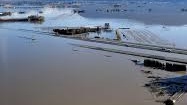Still long way to go to protect from extreme weather: UN report
Dubai, Dec 4 (IANS) More lives are being protected from extreme weather and dangerous climate change impacts but there is a long way to go. Half of countries globally still do not have adequate multi-hazard early warning systems.
A new report from the United Nations Office for Disaster Risk Reduction (UNDRR) and the World Meteorological Organization (WMO) finds that Africa has doubled the quality of early warning systems coverage, but still falls below the global average.
Less than half of the Least Developed Countries and only 40 per cent of small island developing states have a multi-hazard early warning system. In the Arab states, risk knowledge to underpin early warning systems was found to be particularly low.
The report, the 2023 Global Status of Multi-Hazard Early Warning Systems, analyses the latest data one year into the Early Warnings for All Initiative which aims to cover everyone everywhere by 2027.
It was launched at COP28 by United Nations Secretary-General António Guterres at a high-level event attended by ministers and stakeholders. The report reveals that 101 countries have reported having an early warning system, an increase of six countries compared to last year, and representing a doubling of coverage since 2015.
“What we are delivering under the Early Warnings for All initiative can protect and save vulnerable communities from the worst impacts. This is an ambitious goal — but it is also achievable,” said Guterres.
The Secretary-General called for a doubling of the speed and scale of support in countries in 2024.
“For us to make it a reality we need all hands on deck rowing in the same direction — collaborating and cooperating in a way that we have not done before.”
New announcements made on Sunday at the high-level event included 60 million Swedish Krona (5.3 million euros) from Sweden and 40 million Danish Krone (5.4 million euros) and confirmation of an additional 8 million euros per year in funding from France.
The new funding will speed more rapid progress and build on the foundations already laid since the initiative was launched, including the joint commitment of all major Multilateral Development Banks and the Green Climate Fund in scaling up investment for early warning systems.
The focus now is on scaling up support in more countries and securing the finance to deliver Early Warnings for All in the next four years.
Maldives, Laos and Ethiopia now have dedicated national action plans and coordination structures in place.
Benin has strengthened communications to reach communities at greatest risk. Fiji’s flash flood warning has been strengthened to protect the entire population of nearly one million people, Guterres said.
Over 400 million people in Least developed countries (LDCs) and Small Island Developing States (SIDS) now have access to better predictions and warnings for floods, drought, heat waves and tropical cyclones. Countries such as Papua New Guinea and Burkina Faso can now issue drought seasonal predictions for small-scale farmers, many of them women, thanks to the Climate Risk and Early Warning Systems Initiative (CREWS).
France announced that it would provide annually eight million euros to CREWS for the coming years, a doubling of their previous commitments. This announcement complements financing this year by Canada, Switzerland, Luxembourg, Monaco and Britain. This has resulted in the largest increase in annual contributions since the launch of the initiative.
–IANS
vg/dpb




Comments are closed.